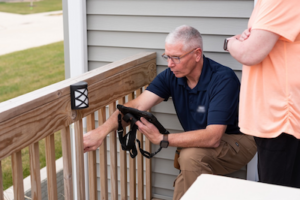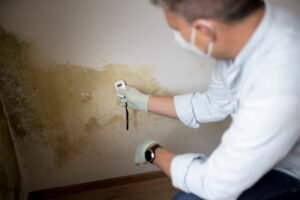The Top 10 Questions to Ask a Home Inspector Before Hiring Them
When it comes to purchasing a new home, there’s a lot at stake. It’s a significant investment, and you want to ensure that you’re making the right decision. This is why a home inspection is an essential step in evaluating a property, whether you are a home buyer, seller, investor, or even a current homeowner. It ensures that the property is safe, structurally sound, and free of any potential hazards. Choosing a qualified home inspector is crucial to this process. To help you make an informed decision, we have compiled a list of the top 10 questions to ask a home inspector before hiring them.
Why is a Home Inspection Important?
Before diving into the questions, let’s first understand why a home inspection is essential. A home inspection is a thorough evaluation of a property’s condition, including its structural integrity, electrical systems, plumbing, and more. It helps you identify any hidden problems that may not be apparent during a casual walk-through. By hiring a qualified and experienced home inspector from a reputable and reliable home inspection company, you can gain valuable insights into the property’s condition and make an informed decision about your purchase.

1. What are your qualifications and certifications?
The first step in determining the credibility of a home inspector is to inquire about their qualifications and certifications. Reputable inspectors should possess the necessary licenses required by the state or region and should be certified by a reputable institution or home inspection franchise for the services they are offering.
2. How much experience do you have?
Experience is invaluable in the home inspection industry. Inquire about the number of inspections the inspector has conducted and their years in the field. A seasoned inspector will be more adept at identifying potential issues, understanding local building codes, and providing insightful recommendations. Ask about the types of homes they have inspected, as this can give you an idea of their familiarity with properties similar to the ones you are considering.
3. What does your inspection cover?
A comprehensive inspection should cover all major systems and components of a home, including the structure, foundation, electrical, plumbing, HVAC, sewer scope, and roofing. Ensure the inspector’s services align with the industry’s standard practices, as outlined by organizations like the American Society of Home Inspectors (ASHI) or the International Association of Certified Home Inspectors (InterNACHI). Request a detailed checklist of the items they will inspect so you can compare them with other inspectors and ensure nothing is overlooked.
4. Can I attend the inspection?
Whether you are a buyer or a seller, attending the inspection allows you to gain firsthand knowledge of the property’s condition and ask questions directly. A professional inspector should welcome your presence and encourage your participation. This also provides an opportunity for the inspector to educate you on essential home maintenance practices and demonstrate how various systems function.
5. What kind of report will I receive?
A thorough home inspection report should be clear, and concise, and include photos, descriptions, and recommendations for addressing any issues discovered. Request a sample report to assess the inspector’s reporting style and ensure it is easy to understand. The report should be delivered promptly, ideally within 24 hours of the inspection, allowing you to make timely decisions based on the findings.
6. How long will the inspection take?
The duration of a home inspection depends on the property’s size, age, and complexity. An average home inspection should take between 2-4 hours. Ensure the inspector is willing to dedicate the necessary time to conduct a comprehensive examination and discuss their findings with you. Avoid inspectors who promise unusually quick inspections, as this may indicate a lack of thoroughness.

7. What is the cost of the inspection?
While cost should not be the primary factor in selecting a home inspector, it is essential to understand their fees upfront. Compare prices and services among different inspectors to ensure you are getting the best value for your investment. Keep in mind that the cheapest option may not always be the best choice, as the quality of the inspection and report is of utmost importance.
8. Do you offer any additional services?
Some home inspectors offer additional services, such as radon testing, termite inspections, or mold assessments. Determine if these services are available, their costs and if they are necessary for your specific property. Bundling these services with home inspection may result in cost savings and provide a more comprehensive understanding of the property’s condition.
9. Do you carry Errors and Omissions (E&O) insurance?
E&O insurance protects both the inspector and the client in case of any errors or oversights during the inspection. Hiring an inspector with E&O insurance demonstrates their commitment to professionalism and accountability. This coverage also provides peace of mind, knowing that you have recourse in the event of a dispute or missed issue.
10. Can you provide references?
Request references from past clients to gain insight into the inspector’s work quality, professionalism, and communication style. Contact these references and ask about their experiences, the inspector’s thoroughness, and whether they would recommend their services.

Frequently Asked Questions (FAQs)
1. Can a home inspector tell you how much repairs will cost?
While a home inspector can identify potential issues, they typically don’t provide cost estimates for repairs. It’s recommended to consult with qualified contractors or specialists for accurate repair cost assessments.
2. How long is a home inspection report valid?
A home inspection report is valid only for the time at which the inspection was conducted. The condition of a property can change over time, so it’s advisable to have a new inspection if you’re considering purchasing the same property after a significant period.
3. Can a seller back out of a contract based on a home inspection?
In most cases, a home inspection is conducted during the due diligence period, allowing the buyer to negotiate repairs or request a price reduction. If the seller is unwilling to address the issues identified in the inspection, the buyer may have the right to terminate the contract.
4. Can a home inspector identify all issues?
A home inspector’s role is to identify visible issues and potential concerns based on their expertise. However, there may be hidden or latent defects that are not readily apparent during a visual inspection. It’s important to have realistic expectations regarding what a home inspection can uncover.
5. Should I attend the home inspection?
Attending the home inspection is highly recommended. It gives you the opportunity to ask questions, gain insights into the property’s condition, and understand any potential issues firsthand.
6. What should I do if the home inspection reveals significant problems?
If the home inspection uncovers significant problems, you have a few options. You can negotiate with the seller for repairs or a price reduction, request to be released from the contract, or consult with other professionals to assess the extent of the issues.
7. How do I become a home inspector?
To become a home inspector, you typically need to complete a training program or course in home inspection, gain practical experience, and obtain any necessary licenses or certifications required by your state or region. After this, you can start your own business, or you can look for the best home inspection franchise to own for aspiring entrepreneurs.
In Conclusion
Selecting the right home inspector is a vital step in evaluating a home and property as a whole and safeguarding your investment. By asking these top 10 questions, you can ensure that you choose a qualified, experienced, and professional inspector who will provide a comprehensive assessment of the property in question. A thorough home inspection will not only offer you valuable insights into the property’s condition but also grant you peace of mind. Remember that a well-informed decision can save you from potential issues and costly repairs in the future. So, take the time to research and vet potential home inspectors to ensure you receive the highest quality service and make the most informed decisions about your property.
